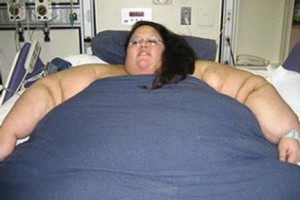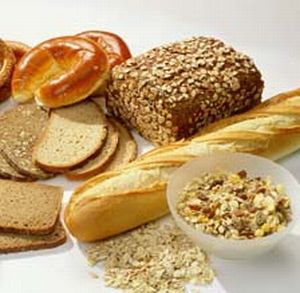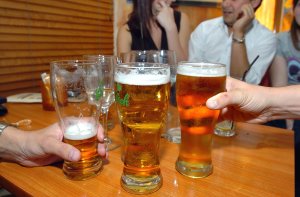Women and Heart Disease Across the Lifespan Part 1 (Young Women)
05/26/2010Whole Grains May Help Control Blood Pressure
11/17/2009Previous research has shown that women who eat more whole grains are less likely to develop high blood pressure. But the impact of whole grains on men’s blood pressure was unknown.
A recent study published in the American Journal of Clinical Nutrition (September 2009) followed over 31, 000 men for 18 years. Men with the highest daily whole grain consumption were 19% less likely to develop high blood pressure versus men who ate the least amount of whole grains. The lower blood pressures were found regardless of weight, physical activity, fruit and vegetable intake.
So whole grains can help control blood pressure in both women and men. The current dietary guidelines recommend that adults eat at least 3 ounces or 85 grams of whole grains daily. Whole grains are richer in nutrients because they retain their bran and germ unlike refined grains.
“Take Charge: A Woman’s Guide to a Healthier Heart” discusses how women can help control their blood pressure, cholesterol and other risk factors to prevent a heart attack, stroke and diabetes. “Take Charge: A Man’s Roadmap to a Healthier Heart” is due to be released Fall 2009. For more info visit www.heart-strong.com
Bedtime Aspirin May Help Lower Blood Pressure
09/03/2009This is an interesting initial evaluation of the effects of a daily low dose aspirin taken just before bedtime. Patients were randomized to receive aspirin at different times during the day. All of the patients had pre-hypertension, these are people with borderline high blood pressure readings not yet receiving blood pressure medications. Blood pressure measurements were evaluated with a 48 hour ambulatory blood pressure monitor, prior to starting daily aspirin usage and then 3 months after starting daily aspirin usage. Blood pressure measurements did not change in patients taking aspirin in the morning upon awakening. Seventy-one percent of the patients who took aspirin at bedtime experienced a reduction in their blood pressure readings. No changes in heart rate were observed in any of the patient groups over time. The researchers believe the aspirin when given at night may be decreasing the nocturnal renin peak and enhancing the production of nitric oxide. Both of these substances could facilitate blood pressure lowering.
This was a small study and a larger multicenter trial is being developed. But the take away message is – if you are taking a daily aspirin and have high blood pressure/hypertension or borderline high blood pressure readings it may be more beneficial to take the aspirin dose at bedtime. Definitely something to discuss with your healthcare provider or pharmacist.
For more heart healthy info visit www.heart-strong.com
Over-the-Counter Meds to Avoid With Hypertension
08/30/2009Over-the-Counter Meds to Avoid With Hypertension
from the Heart Health Center
Q: I’m finding that so many over-the-counter medications warn against taking them if you have high blood pressure. Can you tell me why and what medications I should avoid?
A: It’s funny, isn’t it? We often assume that just because a medication is available without a prescription that it must somehow be safer than prescription medications. But the reality is that all drugs can have harmful side effects. Even aspirin can increase the risk of stomach bleeding, and acetaminophen (Tylenol) can contribute to liver damage.
Thus, the decision to use a specific medication should always depend on a complete understanding of its potential risks and benefits.
You are correct. Several over-the-counter (OTC) medications can contribute to high blood pressure. Others could interact with your high blood pressure medication, making it less effective. The OTC medications to watch out for include:
Pain relievers. Non-aspirin, nonsteroidal anti-inflammatories (NSAIDs) such as ibuprofen (Motrin) and naproxen (Alleve) can increase blood pressure even if you’re already taking an anti-hypertensive medication. They appear to constrict blood vessels and increase the amount of sodium your body holds onto, both of which can cause high blood pressure. Chronic use of high-dose NSAIDs also causes kidney damage, which raises blood pressure.
Oral contraceptives. Birth control pills that contain estrogen can cause high blood pressure in about 5 percent of women who take them. That’s why women with a history of high blood pressure or other risk factors for high blood pressure such as smoking are usually warned not to take estrogen-based contraceptives. Progestin-only pills are a contraceptive option for women with high blood pressure.
© 2009 National Women’s Health Resource Center, Inc. (NWHRC) All rights reserved. Reprinted with permission from the NWHRC. 1-877-986-9472 (tollfree). On the Web at: www.healthywomen.org.
Antihistamines and decongestants. Products containing either of these ingredients (think Benadryl and Sudafed) can increase blood pressure and interact with your blood pressure medications. Check labels of allergy, flu and cold preparations, most of which contain one or both.
Weight-loss preparation. Many of these products contain antihistamines and other substances like caffeine that can increase blood pressure. Instead of taking pills to lose weight, talk to your health care professional about lifestyle changes you can make.
Caffeine. Caffeine, which can increase blood pressure, is found in a surprising number of OTC remedies, including some aspirin formulations.
Herbal remedies. Herbal remedies that contain ephedra, found in some weight-loss supplements, can be dangerous in those with high blood pressure. Also avoid taking gingko, an herbal remedy sometimes used for memory problems, if you are also taking a thiazide diuretic. St. John’s Wort can interact with high blood pressure medications.
If you have high blood pressure, talk with your health care professional about which OTC medications and herbal remedies are safe for occasional use. Also make a point of reading the ingredient lists on OTC remedies and the inserts that come with all products.
© 2009 National Women’s Health Resource Center, Inc. (NWHRC) All rights reserved. Reprinted with permission from the NWHRC. 1-877-986-9472 (tollfree). On the Web at: www.healthywomen.org.
6 Affordable and Effective Exercise Essentials
08/26/2009If you need inspiration to become more physically active, a push to get going or just want to have more fun, here are six of the best, easy-to-afford and effective pieces of exercise gear.
Using just one of these regularly will improve your fitness without straining your budget:
Resistance bands: Stretchy and fun, they do the work of weights but pack easily in a purse or pocket. Versatile for several body areas. ($3+)
Jump rope: Remember when you could jump for hours with your friends? You don’t need hours now—just 5 or 10 minutes of jumping (indoors, if you prefer) will boost your activity level and burn calories. ($3+)
Exercise mat: You’ll be more comfortable, with a safer grip, than exercising on a carpet or bare floor. That will help you be active more easily, for a longer time. ($15+)
Hand weights: Keep a set by the computer or TV and use while watching something entertaining. ($5+)
Exercise ball: Sized for your height, most of these come with their own pump for easy inflation (and reinflation). Great for strengthening various muscle groups. Use as a chair and you’ll get a bit of a workout just from balancing on it. ($15+)
Pedometer: Just put it on and in a day or two you’ll be more aware of how much (or little) you’re moving every day. Aim to increase your average daily steps by 5 percent every week until you reach 10,000 steps a day, a goal that the American Heart Association and other experts suggest. Then add more to increase benefits. ($10+)
Often, you can find fitness items such as exercise DVDs, roller skates, workout clothing and more at yard or garage sales for just a dollar or two.
If you’re interested in acquiring big home-gym equipment, yard sales and online community boards are great places to find barely used items. Recently, one site had offerings that included treadmills for $35 to $75, a weight bench for $1 and an elliptical machine for $180. Just remember that you’ll probably have to arrange for transporting the big and heavy pieces—as well as find a space for them in your home.
© 2009 National Women’s Health Resource Center, Inc. (NWHRC) All rights reserved. Reprinted with permission from the NWHRC. 1-877-986-9472 (tollfree). On the Web at: www.healthywomen.org.
Is Obesity Becoming an Epidemic?
08/19/2009

We keep seeing in the news that more American adults (and even kids) are becoming overweight. Is this trend heading towards an obesity epidemic? The Centers for Disease Control recently released new statistics. Their latest survey reports that 26.1% of US adults in 2008 were obese compared to 25.6% in 2007. In Alabama, Mississippi, Oklahoma, South Carolina, Tennessee and West Virginia 30% or more were obese. NJ (our home state) is below the national average at 22.9%. Colorado was the only state with an obesity rate <20%. Now some really sad news: no state in the US showed a significant decrease in obesity between 2007 and 2008. Obesity increases a person risk for diabetes, heart disease and stroke. What does the future hold for the health of Americans?!?
Our new book “Take Charge: A Woman’s Guide to a Healthier Heart” discusses risk factors for heart disease and stroke and offers tips for women to decrease their risk and their family’s risk for future heart problems. Please visit www.heart-strong.com for more info.
5 Tips to Lower Blood Pressure
08/04/2009
High blood pressure increases your risk for stroke and heart failure (weakening and enlargement of the heart muscle). About 1 in 3 adults have high blood pressure in the United States. Medications of course can help to lower blood pressure and many adults need at least 2 or 3 different medications to control their blood pressure especially as they get older.
Here are a couple of lifestyle changes that can also help lower your blood pressure:
1) Low Sodium (salt) Diet – recommendation is less than 2,000 mg of sodium daily
2) Increase Potassium Rich Foods – recommendation is 4,700 mg of potassium daily. Good food sources of potassium include: Bananas, Dried beans, Tomatoes, Beef, Orange juice/grapefruit juice, Milk, Coffee, Potatoes, Kidney beans, Salmon/Halibut.
3) Exercise – Aim for 30 minutes 5 to 7 days every week
4)Weight loss (if overweight) or maintain healthy weight
5) Use fresh garlic (chop garlic and let sit for 15 minutes – this allows garlic to oxidize and gets converted to allicin which is the heart healthy part of garlic)
The goal blood pressure for all adult men and women is less than 120/80 (this includes adults taking blood pressure medications).
A recent Centers for Disease Control publication stated that ONLY ABOUT 30% of adults with high blood pressure have their blood pressure well controlled!!! This is an important health risk and you need to play an active role – follow the lifestyle changes listed above, monitor your blood pressure regularly, know your numbers, and discuss your blood pressure with your healthcare provider.
“Take Charge: A Woman’s Guide to a Healthier Heart” discusses how women can help control their blood pressure and other risk factors to prevent a heart attack, stroke and heart failure. “Take Charge: A Man’s Roadmap to a Healthier Heart” is due to be released Fall 2009. For more info visit www.heart-strong.com
Binge Drinking Increases Stroke Risk
07/26/2009Regular “moderate” alcohol consumption is associated with a lower risk for heart disease and strokes (1 drink per day for women and 2 drinks per day for men). But heavy alcohol intake can increase the risk of strokes. Excessive chronic alcohol intake has previously been shown to increase the risk of high blood pressure and heart failure. A study published in the journal Stroke (October 2008) found that binge drinking (common among young people) can also significantly increase the risk of stroke.
Over 15,000 men and women between the ages of 25 and 64 were followed for a ten year period. Binge drinking was defined as 6 or more alcoholic beverages in one session for men or 4 or more drinks for women. Binge drinking was reported to be an independent risk factor for strokes.
Younger people need to understand the potential dangers of binge drinking. Remember moderation is key!
For more heart healthy info visit www.heart-strong.com



 Posted by heartstrong
Posted by heartstrong 






